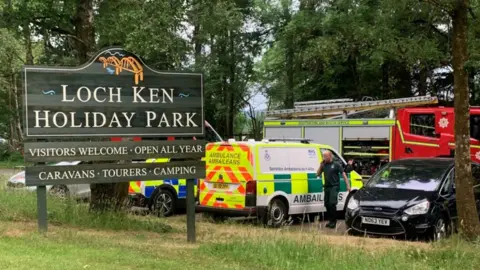Loch Ken: Police divers join search for man missing in loch
 BBC
BBCPolice divers are searching a loch in Dumfries and Galloway for a missing man, BBC Scotland understands.
The 28-year-old got into difficulty at a popular swimming location in Loch Ken on Sunday afternoon.
Emergency services mounted a large-scale search for the man but have yet to find him.
It came as a senior coastguard involved in the search warned about the dangers of cold water shock and drinking alcohol before going into the water.
Stewart Bryden, senior coastguard operations officer based at Kirkcudbright, said the man had been at the loch with friends when he went for a swim but he failed to resurface.
He told BBC Scotland he wanted people to be aware that the temperature of the water could still be low, even in warm weather.
Cold water - anything below 15C (59F) - can cause the body to go into shock causing involuntary gasping, rapid breathing or hyperventilating.
Mr Bryden said the water temperature in Loch Ken was about 9C (48F).
He also warned of the dangers of drinking alcohol before swimming.
"We always say 'drink and drowning'. If people are taking alcohol and deciding to go on swims it's not a good mix," he said.
"I'm not here to stop people going in the water, I'm here to say be aware of the temperature of the water and be aware of the activity you have been doing before the water."
A search and rescue helicopter joined firefighters, ambulance workers, police officers and coastguard teams at the spot where the man got into trouble.
It is next to Loch Ken Holiday Park, near Castle Douglas, and is popular with swimmers and paddleboarders during the warm weather.
BBC Scotland understands that swimmers have been advised to avoid the area.
Police Scotland confirmed that inquiries and searches were continuing on Tuesday.

How to survive cold water shock
The RNLI (Royal National Lifeboat Institution) say there are five steps to know how to float:
- If you fall in the water, fight your instinct to thrash around.
- Lean back, extend your arms and legs.
- If you need to, gently move them around to help you float.
- Float until you can control your breathing.
- Only then, call for help or swim to safety.
Find out more about the RNLI's "float to live" campaign.

